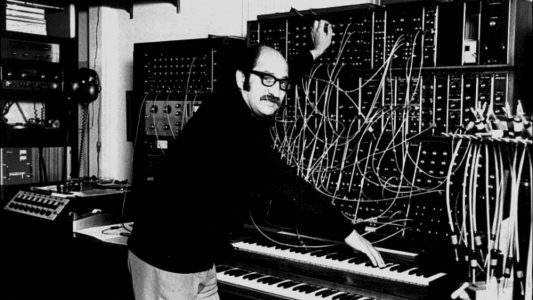CITR’s 24 Hours of Radio Art in a snack sized format. Dark Ambient. Drone. Field Recordings. Noise. Sound Art. Or something.
Tuesday morning’s show features the Excellent Jacket-curated Audio: An Experimental Noise Compilation, Incidental Press‘ 100 Block Rock compilation showcasing Vancouver’s most marginalized community of artists – the people working, living and creating in the Downtown Eastside (DTES), new Cabaret Voltaire, plus Canadian composer and electronic music pioneer Mort Garson.
Starting at 11 AM Pacific on CITR FM 101.9, streaming at PLAYER.CITR.CA
(Photo Courtesy of Sacred Bones Records)
==========
This month, Sacred Bones Records releases a collection of four long-out-of-print, rare and unreleased recordings by Canadian composer and electronic music pioneer Mort Garson (1924-2008). Both a fearless visionary and cheesy-trend chaser, his records from the ’60s and ’70s were among the first to incorporate the Moog synthesizer.
Garson’s Didn’t You Hear soundtrack (1970) is considered one of the first-ever all-electronic movie scores and a highly-coveted collector’s item, while his Electronic Musical Impressions of the Occult and Black Mass (recorded as Ataraxia and Lucifer respectively) inspired generations of aggressive soundscape and dark electronic music composers heard on CITR 101.9 FM. And then there’s Garson’s Mother Earth’s Plantasia – ‘Warm Earth Music For Plants and the People That Love Them’ (1976) for the rest of us who aren’t necessarily aggressive soundscapers or dark electronic music composers, but still want the best for the ferns, philodendrons, orchids and succulents that, for better or for worse, make up our social network these days.
Long time CITR 101.9 FM contributor and Crespan Co-Conspirator Mark Hjorthoy recently had the pleasure of speaking to Mort Garson’s daughter Day Darmet…
Mark: Do you have a favourite composition of your father’s? If so, why is it your favourite?
Day: Yes, it was a song that he wrote for my mom. It was called: “Don’t Go Away” He would sing it for her often. It was melodic and beautiful.. like my mom.
Can you tell us in your own words why Mort went from being a successful musical arranger to creating experimental electronic pieces? That didn’t happen often.
Right, I believe that he has always wanted to be something bigger than a commercial artist. He studied music at a very young age, graduated from Juilliard and went from there to become a family man with a family to support. But, at night, he would have musicians over from everywhere and anywhere and they would jam until the morning sun arrived. When he got a bit older, I believe he decided it was time to find his passion in music. He had heard about the Moog, and he dove in.. like a fish into water. It was his oxygen.
Being one of the early users of Moog synthesizers on a record, was there ever a point where he thought it might be a mistake? The musicians’ union were up in arms about this electronic box that might put musicians out of work. Did he run into any backlash about it
Good question: I think he did worry, when he saw that he was not going to make as much money as with his commercial projects. But that did not stop him from marching forward. I don’t know if he knew about all the hoopla going on backlashes. He never paid attention to any of that.
Mother Earth’s Plantasia was the only experimental electronic album by Mort that entered the charts. Most experimental composers at the time would have been upset about that. Was he happy about it?
My dad was thrilled about that. It meant that people were listening.
Did Mort enjoy experimental composing more than writing and arranging pop songs?
All music he could write was good music. He loved and breathed music. Writing was his passion.
Is there a treasure trove of pieces stored away that we haven’t heard yet?
So Many. I can’t read music, so I don’t know what is written, but he played until the very moment he passed away.
What happened to Mort’s studio? Is it still in place?
No, my dad lived in a flat below me and when he passed (my mom had already passed), I took his studio down and rented the lower unit.
Were you ever there watching him compose? If so, do you have a favorite moment that you remember about it?
Yes! My dad, eyes closed, fingers playing an imaginary keyboard ~ singing part of a tune connected to another song at the same time. It was like a trance. Amazing.
==========

